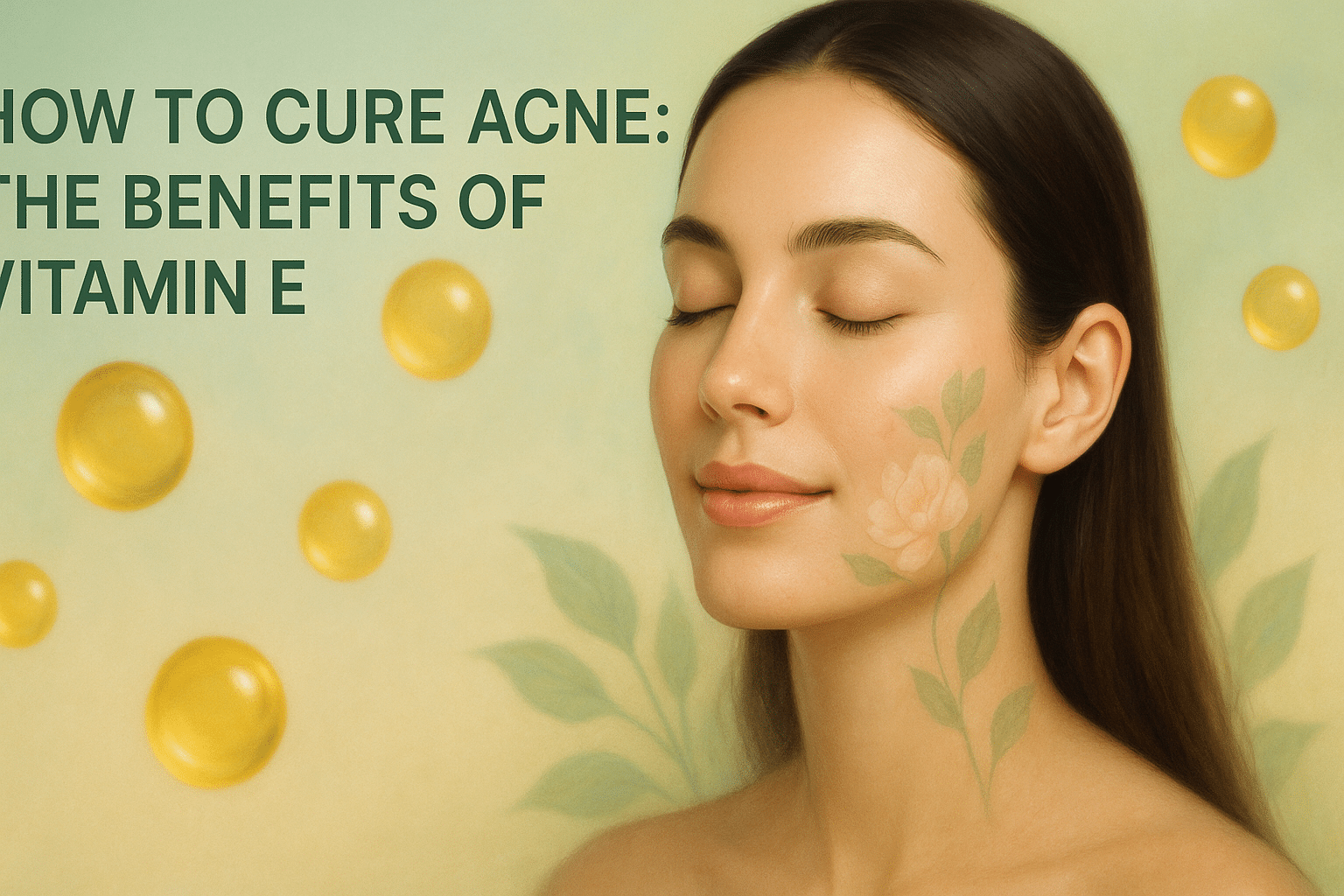How to Cure Acne: The Benefits of Vitamin E
Acne can be a persistent and frustrating skin condition, affecting millions of people worldwide. While there are countless treatments available, one natural remedy that often goes unnoticed is Vitamin E. This powerful antioxidant can play a significant role in improving skin health and potentially reducing acne. In this blog post, we’ll explore how Vitamin E can help cure acne, its benefits, and how to incorporate it into your skincare routine.
Table Of Contents
1. Introduction to Acne and Vitamin E
2. What is Vitamin E?
3. How Vitamin E Helps with Acne
4. Incorporating Vitamin E into Your Skincare Routine
5. Benefits Beyond Acne
6. Conclusion
7. FAQs

Introduction to Acne and Vitamin E
Acne isn’t just a teenage woe; it affects people of all ages, causing physical discomfort and often impacting self-esteem. If you’ve been battling acne for a while, you’re probably familiar with the endless array of treatments promising clear skin. Among these, Vitamin E stands out due to its natural origin and multiple skin benefits. But what makes Vitamin E so special in the fight against acne? Let’s dive in! 🌿
What is Vitamin E?
Vitamin E is a fat-soluble antioxidant that comes in eight different forms, with alpha-tocopherol being the most active in humans. Found naturally in various foods like nuts, seeds, and leafy greens, Vitamin E is essential for maintaining healthy skin. Its primary function is to protect skin cells from oxidative stress and damage caused by free radicals.
How Vitamin E Helps with Acne
Vitamin E’s role in acne treatment is multifaceted. Here’s how it can help improve your skin:
1. Anti-inflammatory Properties: Acne is often accompanied by inflammation and redness. Vitamin E helps reduce inflammation, soothing irritated skin and making blemishes less noticeable.
2. Antioxidant Protection: Acne-prone skin can be sensitive to environmental stressors. Vitamin E’s antioxidant properties help neutralize free radicals, preventing damage to skin cells and reducing the likelihood of breakouts.
3. Moisturizing Effects: Proper hydration is crucial for healthy skin. Vitamin E is known for its moisturizing properties, which help maintain the skin’s oil balance, preventing overproduction of sebum—a common cause of acne.
4. Healing and Repair: Vitamin E aids in the healing process of acne scars by promoting cell regeneration, leading to smoother skin over time.
Incorporating Vitamin E into Your Skincare Routine
Adding Vitamin E to your skincare regimen can be simple and effective. Here are some ways to do it:
1. Topical Application: Look for creams and serums that contain Vitamin E. Applying these products directly to your skin allows for targeted treatment of acne and scars.
2. Dietary Sources: Consuming foods rich in Vitamin E, such as almonds, sunflower seeds, and spinach, supports overall skin health from the inside out.
3. Supplements: If dietary sources aren’t sufficient, Vitamin E supplements can be a great addition. However, consult with a healthcare professional before starting any supplementation.
4. DIY Masks: Create a homemade face mask by mixing Vitamin E oil with honey or yogurt for a nourishing and hydrating skin treatment.
Benefits Beyond Acne
While Vitamin E is beneficial for acne, it also offers several other skin perks:
1. Anti-Aging: Vitamin E helps combat signs of aging by reducing wrinkles and fine lines, thanks to its ability to promote collagen production.
2. Sun Damage Repair: It can help repair skin damage caused by UV exposure, minimizing sunspots and hyperpigmentation.
3. Overall Skin Health: Vitamin E contributes to a healthier skin barrier, enhancing skin resilience and elasticity.
Conclusion
Vitamin E is a versatile and powerful ally in the fight against acne. Its antioxidant, anti-inflammatory, and moisturizing properties make it an excellent choice for anyone seeking a natural solution to improve skin health. Whether you choose to apply it topically or incorporate it into your diet, Vitamin E can help you achieve a clearer, more radiant complexion. Remember, consistency is key, and results may vary from person to person. 🌟
FAQs
Q: Can Vitamin E cause breakouts?
A: While Vitamin E is generally safe for most skin types, it can cause breakouts in some individuals, particularly those with oily skin. It’s recommended to patch-test any new product before full application.
Q: How often should I use Vitamin E on my skin?
A: For topical application, using Vitamin E products 2-3 times a week is generally sufficient. However, this can vary depending on your skin type and the product’s formulation.
Q: Can I use Vitamin E with other acne treatments?
A: Yes, Vitamin E can be used alongside other treatments such as benzoyl peroxide or salicylic acid. It may help counteract the dryness that some acne treatments cause.
Incorporating Vitamin E into your skincare routine can be a game-changer for acne-prone skin. Give it a try and enjoy the benefits of healthier, clearer skin! 🌼
